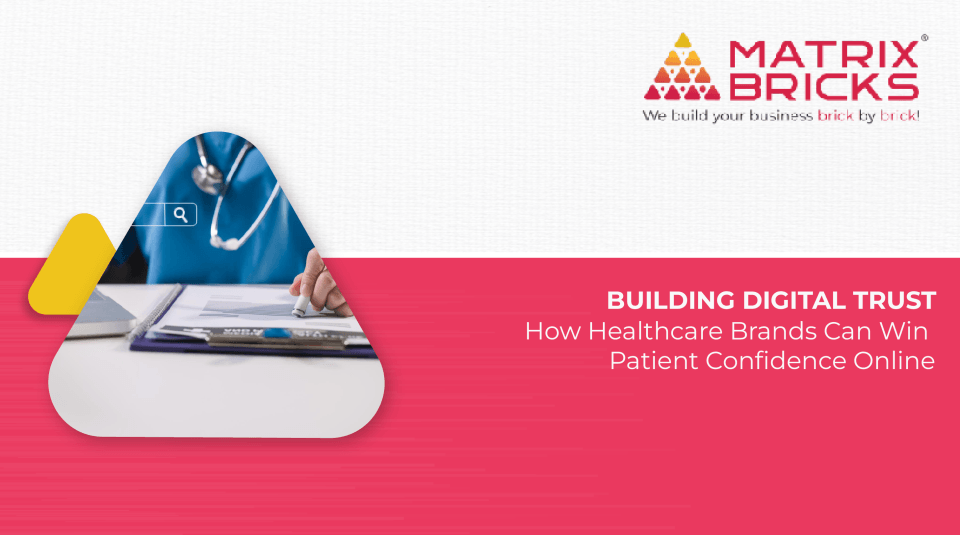
In today’s fast-changing digital world, patients no longer simply walk into the clinic and trust that everything will be fine. Instead, they research, click, and read long before they choose a doctor or a brand. For healthcare organisations, this shift poses a challenge and an opportunity. With low patient trust and online credibility as a reality, the brands that can build genuine digital trust will stand out, especially as the 2026 trend shows patients relying heavily on online reviews, doctor credibility, and verified medical content.
Here’s how healthcare brands can step up their game with innovative strategy, strong execution, and clear focus on credibility, reputation, and trust. You’ll read about key elements of healthcare SEO, patient trust factors, and the importance of online reputation management for doctors.

The Rise of Patient-Centric Marketing
Patients are no longer passive. They expect healthcare brands to speak with them. In this era, patient trust becomes a form of currency, and marketing is not just about flashy slogans as much as it is about credible relationships.
Why Patient-Centric Matters
- Patients research online: By 2026, an increasing number of people will consult reviews, provider credentials, and medical content before making a healthcare decision.
- Patients expect transparency: They want to see who the doctor is, what the clinic stands for, and how safe the website is.
- Feeling safe = choosing you: When a patient sees confirmed reviews, readable content, and a credible brand, the barrier to booking drops.
What this means for your brand
- Shift from “we do” to “we help you” language. Speak in terms of patients’ concerns, questions, and journeys.
- Emphasise authenticity: Show real people, real stories, not just stock photos.
- Consider the digital experience: If the website is slow, confusing, or outdated, that affects patient trust. Technical performance is now a key component of trust-building.

The role of healthcare SEO
When you dig into how clinics get found online, you’ll see that healthcare SEO isn’t just about keywords and links—it’s about trust, reputation, and visibility.
- Search engines treat healthcare content differently because it’s YMYL (“Your Money or Your Life”).
- One major factor: patient trust. If the patient doesn’t feel confident, they won’t click, read, or convert.
- So, when you build your marketing strategy, centre it on the patient’s experience, not just your services.
In short, the rise of patient-centric marketing means your brand needs to embody trust, transparency, and relevance. It is not enough to have an excellent service—you must show it convincingly online.
Essential Websites Trust Signals for Clinics
A clinic’s website is often the first point of contact for a potential patient. And first impressions count. If your site lacks obvious trust signals, you might lose the patient before you speak to them. Let’s unpack the must-have elements.
Key trust Signals
Here are the core components that communicate credibility and build patient trust online:
- SSL/HTTPS: A secure website (indicated by a padlock) assures patients that their data is safe and that the clinic prioritizes security.
- Doctor credentials and biographies: Listing the qualifications, license numbers, publications, and years of experience—this builds authority.
- Patient reviews & testimonials: Real feedback from real patients. These act as social proof—vital in healthcare.
- Up-to-date contact information, address, and hours: Clear, consistent listings across the site and directories.
- Clear privacy & compliance statements: Especially in healthcare, you need to demonstrate that you respect regulations and prioritize patient safety.
- High-quality content with citations: When you publish health information, it should cite trusted sources, link to studies, and be authored or reviewed by physicians.
- Mobile-friendly, fast site performance: Bad user experience erodes trust quickly.
- Structured data/schema, FAQs: Helps search engines and patients quickly spot that you’re credible and helpful.
Website Trust Signals
Here’s a simple breakdown of some of the most critical trust signals and what they signal to patients:
| Trust Signal | What It Communicates | Why It Matters |
| SSL / HTTPS | Your site is secure and professional | Helps reassure about data safety |
| Doctor credentials & bios | The provider is qualified and experienced | Builds authority and reduces doubt |
| Real patient reviews | Others have used this service and trusted it | Social proof increases conversions |
| Clear contact & location info | The clinic is real, local, and easy to reach | Builds local credibility |
| Privacy, compliance statements | You follow industry rules and protect patients | Reinforces trust in the regulated space |
| High-quality content & citations | You are knowledgeable, not just marketing | Patients looking for real answers |
| Fast, mobile-friendly website | The digital experience is smooth and modern | Poor UX reflects poorly on your brand |
Applying these in your marketing
- Audit your website as if you were a patient: What questions would you ask? Can you easily find proof of your doctor’s credibility?
- Review the content: Is it clearly written, helpful, and free from hype?
- Ask yourself: “Would I feel comfortable booking after visiting this site? If not, you have work to do
- Utilize the concept of online reputation management for doctors to ensure all listings, reviews, and profiles are consistent and up-to-date.
By embedding these trust signals consistently, you’ll set the foundation for stronger patient confidence and better digital performance.
Managing Online Reputation Reviews
In this digital era, your online reputation is as important as, if not more important than, your actual reputation. Patients heavily rely on what they read and see before they decide to visit. The trend for 2026 is clear: they will look for doctor credibility, online reviews, and verified medical content.
Why reviews matter so much
- They act as social proof. When a prospective patient sees that others have had good experiences, it reduces fear and hesitation.
- They affect visibility. Positive reviews help with healthcare SEO—search rankings improve when reviews are strong/consistent.
- They shape perception before the first call. Many patients decide based on reviews before looking at your website.
- They reflect your culture. How you respond to reviews (especially negative ones) says a lot about your brand’s transparency and patient focus.
Steps for effective online reputation management for doctors
- Claim and optimise your listings: Ensure your clinic has verified profiles on Google My Business, health directories, and review sites.
- Encourage feedback: After appointments, send an email or SMS asking patients for a review (when appropriate).
- Respond to reviews: Both positive and negative reviews matter. Show appreciation for feedback and respectfully address issues.
- Monitor and audit regularly: Keep track of reviews in real-time, spot trends (e.g., complaints about wait time), and use that feedback to improve.
- Be consistent: If one location of your clinic has stellar reviews and another doesn’t, that reflects uneven service.
- Use feedback as an internal improvement tool: Share review insights with your team to enhance the patient experience.
- Integrate reviews into your website: Showcase select testimonials as part of your website trust signals to build credibility.
Why Reputation Matters for 2026
As the studies show, healthcare SEO and patient behaviour are evolving, patients increasingly rely on reviews, and search engines reward credible brands. For example:
- An article notes that many patients will not even visit a website if there are no recent reviews.
- Healthcare content must satisfy the E-E-A-T (Experience, Expertise, Authoritativeness, Trustworthiness) criteria — trustworthiness is directly tied to reputation.
- So, reputation management is not optional—it’s core to your digital strategy if you want to build patient trust, rank well, and convert.
Creating Helpful Health Content Without Violating Compliance
Producing health content that engages, educates, and builds patient trust is a major opportunity. But it is also a risk zone: healthcare content must be accurate, safe, and compliant. The right balance helps your brand shine.
Why content matters for patient trust & healthcare SEO
- Good content shows you understand patient concerns and can provide real value—not just market services.
- Search engines value content that demonstrates expertise and trustworthiness, especially for health-related topics.
- Content helps establish your brand’s authority and strengthens the overall online reputation management for doctors.
Key guidelines for compliant, helpful health content
- Use medically reviewed or authored content: Whenever possible, have doctors or qualified writers create or review content.
- Avoid making unverified claims: Don’t promise specific outcomes (“you will definitely be healed in 2 weeks”) unless you have evidence to back it up.
- Include disclaimers: Make clear that information is educational, not a substitute for professional care.
- Cite trusted sources: Use reputable journals, health organisations, or clinical guidelines to support your content.
- Use clear, jargon-free language: Patients appreciate content in simple English they can understand.
- Structure your content for readability: use headers, bullets, and FAQs, as patients often skim.
- Pay attention to accessibility & regulation: Ensure your website meets accessibility standards and health data protection requirements.
- Stay up to date: Medical guidance is subject to change. Outdated content can harm trust and even lead to liability.
Content ideas that build trust
- Blog articles on common patient questions (e.g., “What to expect during your first consultation”)
- Doctor profile pages with credentials, short video intros
- Patient story/case-study pages (with consent)
- FAQ pages answering real-world patient concerns
- How-to guides for directing care, e.g., “How to prepare a surgery”
- Short, safe videos or animations explaining procedures
When you do this well, you support your brand’s credibility while also doing healthcare SEO the right way: you’re not just chasing search traffic—you’re building trust, visibility, and real patient connection.
In an age where patients begin their journey online, healthcare brands must adapt. With low patient trust & online credibility in many cases, and the 2026 trend showing patients rely heavily on online reviews, doctor credibility, and verified medical content, the stakes are high. But so is the opportunity. By focusing on patient-centric marketing, embedding essential website trust signals, managing online reputation & reviews, and creating helpful content within compliance constraints, you can build a brand that both patients trust and search engines reward.
If your healthcare brand is ready to take the next step, we at Matrix Bricks can help you assess your credibility and strengthen your digital foundation. Schedule a healthcare credibility audit today.
Frequently Asked Questions
1. What is healthcare SEO, and why is it different from regular SEO?
Healthcare SEO refers to the practice of optimising websites, content, and online presence specifically for healthcare brands. It differs from regular SEO because patients’ health is at stake, and search engines apply stricter criteria around trust.
2. How do online reviews impact patient trust?
Online reviews are a form of social proof. When patients see positive, recent, credible reviews of a doctor or clinic, they feel more confident choosing them. Since the digital experience is often their first impression, reviews carry heavy weight.
3. What are the most important trust signals on a healthcare website?
Key trust signals include a secure website (HTTPS), detailed provider bios with credentials, patient reviews/testimonials, clear contact information and location details, regulatory compliance statements (such as a privacy policy and data protection), and high-quality, medically reviewed content. We covered these earlier.
4. How can a clinic effectively manage its online reputation?
Key steps include claiming and verifying listings in Google/health directories, regularly encouraging and responding to reviews, monitoring feedback, integrating review insights to ensure improvements, ensuring consistency across platforms, and including at least one positive testimonial on your website. It’s about proactive online reputation management for healthcare professionals, including doctors.
5. How do you create health content that is both helpful and compliant?
Ensure the content is authored or reviewed by qualified professionals, avoid unverified claims, use plain language, cite reputable sources, include disclaimers, structure content for readability, and keep it up to date. This approach also supports your healthcare SEO efforts.







